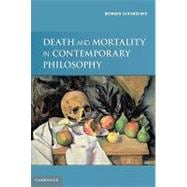
| Preface | p. ix |
| Introduction | p. 1 |
| Human Personal Death | |
| Definitions of Death and What We Mean by Person | p. 13 |
| Introduction | p. 13 |
| Biological Death | p. 17 |
| So-called Personal Death | p. 20 |
| The Anthropological Challenge of Neocortical Death | p. 31 |
| Ethics as the Criterion for Defining Death | p. 38 |
| Diversity of Definitions of Death in a Secular Ethic | p. 45 |
| Conclusion | p. 48 |
| Theory of Knowledge about Death | |
| Scheler's Intuitive Knowledge of Mortality | p. 51 |
| Introduction | p. 51 |
| Modern Man's Attitude Towards Death Itself | p. 53 |
| The Certainty of Mortality Based on Observation and Induction or on Intuition | p. 54 |
| Problematic Questions Raised by Scheler's Thesis of an Intuitive Knowledge of Mortality | p. 58 |
| Heidegger's Being-Towards-Death | p. 61 |
| The Distinction Between Ontical and Ontological | p. 62 |
| The Impossibility of Experiencing My Own Death | p. 64 |
| The Death of Another as a Possible Object of Thanatological Knowledge | p. 68 |
| Being-Towards-Death | p. 72 |
| Critique | p. 80 |
| Is Mortality the Object of Foreknowledge? | p. 85 |
| Inductive Knowledge of Death and Jean-Paul Sartre | p. 91 |
| The Realist and Idealist Concepts of Death | p. 92 |
| The Expectation of My Death | p. 95 |
| Death as Another's Victory | p. 99 |
| Death as a Situation-limit | p. 107 |
| Conclusion | p. 109 |
| Knowledge of Mortality Is Inseparable from the Relation to the Other | p. 112 |
| Death as the Object of Experience | p. 117 |
| Mutual Exclusiveness of the States of Life and Death | p. 122 |
| The Meaning of the Expression "My Death" | p. 127 |
| Death in Life | p. 131 |
| Love as the Unveiling of What Is Unthinkable about Death | p. 139 |
| The Phenomenology of Death | p. 140 |
| Does Death Mean Nothing To Us? | |
| The "Nothingness of Death": Epicurus and His Followers | p. 151 |
| Presuppositions of the Epicurean Thesis of the "Nothingness of Death": Materialism, Hedonism, and Expenentiahsm | p. 151 |
| "Death Is Nothing to Us" | p. 153 |
| The Ancients | p. 155 |
| Modern Thinkers: Montaigne, Feuerbach, Schopenhauer, and Others | p. l65 |
| Discussion of Experientialism and the Need for a Subject | p. 168 |
| The A Priori Character of the Epicurean Assertion that Death Is Nothing to Us | p. 168 |
| First Series of Examples Against Experientialism: Comparisons Between Two States of Life | p. l71 |
| Second Series of Examples Against Experientialism: Comparisons Between a State of Life and a State of Death | p. 174 |
| Third Set of Possible Arguments Against Experientialism: Posthumous Evils | p. 175 |
| The Subject of Posthumous Evils | p. 177 |
| Death: An Evil of Privation Of What Does Death Deprive the Subject? | p. l82 |
| Is Death Always an Evil? | p. 184 |
| Defense of the Characterization of Death as an Evil in View of the Peaceful State of Prenatal Nonexistence | p. 206 |
| Conclusion | p. 213 |
| Bibliography | p. 221 |
| Index of Names | p. 249 |
| Index of Concepts | p. 255 |
| Table of Contents provided by Ingram. All Rights Reserved. |
The New copy of this book will include any supplemental materials advertised. Please check the title of the book to determine if it should include any access cards, study guides, lab manuals, CDs, etc.
The Used, Rental and eBook copies of this book are not guaranteed to include any supplemental materials. Typically, only the book itself is included. This is true even if the title states it includes any access cards, study guides, lab manuals, CDs, etc.